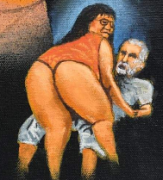|
Your Dunkle Sans made a drunk thread about The Beatles in GBS the other day that devolved into a shouting match over which artist from the 60s/70s was the biggest monster because they did nasty things like child rape and wife beating. I love The Beatles and David Bowie but I must admit they had some bad habits. Same with Cat Stevens - I *love* his stuff but the whole fatwa thing really puts me off. Like Wagner? Nazi. Like Washington and Jefferson? Slaveowners. Seems to me like you can't escape the fact that a LOT of interesting, influential, or otherwise downright awesome people were also one shade or another of awful human. So - can you separate the art from the artist, or are they inseparable? I have come to the tentative conclusion that you have to in order to allow yourself to like basically anything. Look hard enough and there is something not to like about everyone. Can I morally ignore something reprehensible an artist did in their personal life so I can enjoy their art? I sure hope so.
|
|
|
|

|
| # ? May 2, 2024 06:59 |
|
Pierre Menard, Author of the Quixote.
|
|
|
|
I think part of the issue is a temptation take persons as the objects of aesthetic/moral judgment, rather than the particular things they do or say or create. If I say, "Abraham Lincoln was good because he freed the slaves" then I invite someone to respond with "No actually he was bad because he suspected habeas corpus" and then we're suddenly trying to collapse an entire life into a single value judgment. If, on the other hand, all I say is "It was good for Lincoln to free the slaves" or "I quite like Tristan and Isolde" then the question of personal character never comes up. I'm not sold on the idea of value judgments about persons anyway.
|
|
|
|
Roman Polanski is a great filmmaker but a garbage tier human being.
|
|
|
|
Thomas Malory is a interesting case in point. He wrote Morte D'Arthur while in prison for rape and robbery.Shimrra Jamaane posted:Roman Polanski is a great filmmaker but a garbage tier human being. In addition to being a child rapist, Polanski invites people to expensive restaurants and then leaves them with the entire bill. I'm not joking; that is a actual thing he does. https://books.google.com/books?id=t...%20bill&f=false
|
|
|
|
Ultimately I think it boils down to what you yourself judge as enough to tie art to artist. You gotta remember, everytime you say 'I refuse to watch/consume this media because Person X has abhorrent opinions' that they're not the only person who worked on the media. There were a bunch of people who did (aside from the rare one man shows, in which case judge away) As an example: Disney made some *really* racist poo poo, including Sunflower the centaur in Fantasia.  They also did poo poo like firing people for trying to make a union and blacklisted them during the McCarthy era. But we still don't paint the entire company with the same brush because there's a lot of people who work for Disney, and most of them are pretty okay. But of course this is all subjective. You do you, and I'll do me. And that'll be fine. E-Tank fucked around with this message at 08:10 on Apr 1, 2016 |
|
|
|
I think for the most part people aren't thinking about the person when they listen to music or watch a movie or read a book or etc however there are a few people who have such a stigma around their name that its sort of unavoidable to think about them as a person rather than as an artist (Mel Gibson, Ayn Rand are the first two when I think about this)
|
|
|
|
The main reason to not support an artist's work is the "voting with your wallet" idea, where if you're giving them money you must implicitly agree with them. Fortunately, anyone who's dead doesn't really benefit from that. There are obvious exceptions like Mein Kampf or whatever, but in general most people probably won't care.
|
|
|
|
E-Tank posted:Ultimately I think it boils down to what you yourself judge as enough to tie art to artist. You gotta remember, everytime you say 'I refuse to watch/consume this media because Person X has abhorrent opinions' that they're not the only person who worked on the media. There were a bunch of people who did (aside from the rare one man shows, in which case judge away) Even if that were false, that is, even if everyone who ever worked for Disney is a monster, it is still unclear to me how that fact is supposed to bear on an aesthetic assessment of the things Disney produces. Even the 'voting with your wallet' idea floated in the post above this one isn't totally clear. Bracket, for now, the idea that the evil artist's ability to continue to do evil is dependent on funding; that's not usually what people mean. Rather, the implicit premise is generally that if a person is evil then they don't deserve to be comfortable and we all have a moral obligation to see to it that they are not. Why would that be?
|
|
|
|
This strikes me as a pretty much unwinnable battle, almost everybody probably holds an opinion that somebody finds abhorrent, and creative types aren't often that good at hiding their thoughts. Like I was kind of surprised and unhappy to find out that David Mamet was a boorish Israel-can-do-no-wrong type, but I can't deny that I really enjoyed the last production of Glengarry Glen ross I saw I don't really see how that particular aspect of his personality intruded on the work. It kind of reminds of people getting all worked up when a celebrity says something stupid or contentious on Twitter or whatever and say 'Oh I used to think that they were one of the good ones but instead they're just another rear end in a top hat  '. No poo poo, I'm sure you said something that would cause outrage in the public sphere multiple times throughout your life, holding famous people to exacting moral standards is just a recipe for disappointment and when it comes to art, after a certain point we just have to separate the work from the person to be able to enjoy just about anything. Life will be pretty unproductive if we spend our time constantly getting into situations like this: '. No poo poo, I'm sure you said something that would cause outrage in the public sphere multiple times throughout your life, holding famous people to exacting moral standards is just a recipe for disappointment and when it comes to art, after a certain point we just have to separate the work from the person to be able to enjoy just about anything. Life will be pretty unproductive if we spend our time constantly getting into situations like this:https://www.youtube.com/watch?v=_nS66IvbvcI I still watch and appreciation Mel Gibson or Roman Polanski's films for what they are while maintaining that they're both assholes who I'd want nothing to do with any kind of personal level.
|
|
|
|
khwarezm posted:I still watch and appreciation Mel Gibson or Roman Polanski's films for what they are while maintaining that they're both assholes who I'd want nothing to do with any kind of personal level. But what work is 'still' doing here? What relation do you think would otherwise hold between those two opinions?
|
|
|
|
Juffo-Wup posted:But what work is 'still' doing here? What relation do you think would otherwise hold between those two opinions? Sorry I'm having trouble parsing this.
|
|
|
|
khwarezm posted:Sorry I'm having trouble parsing this. You said you still watch and appreciate Mel Gibson and Polanski films even though they're terrible people. Implying that their being assholes is something that would otherwise interfere with your appreciation of their work. I'm asking you to elaborate on that potential interference. What is it about someone being bad as a person that seems like evidence against their having produced good art? Because it seems like it's just a matter of having trouble distinguishing the meanings of e.g. 'This is a good film' and 'The director of this film is a lovely person' respectively.
|
|
|
|
Luna Was Here posted:I think for the most part people aren't thinking about the person when they listen to music or watch a movie or read a book or etc however there are a few people who have such a stigma around their name that its sort of unavoidable to think about them as a person rather than as an artist (Mel Gibson, Ayn Rand are the first two when I think about this) This sounds plausible but I actually think the opposite is closer to the truth. Our enjoyment of media is often heavily mediated by our perception of the author or by our desire to signal something about ourselves through our discerning tastes. Plenty of musicians, actors and even authors capitalize extensively on this and make it central to their marketing strategy.
|
|
|
|
Depends on the difference between how much I like something and how terrible the person was. Like orson Scott card is a poo poo heel and actually actively being terrible towards gay people, so gently caress him. I didn't see the ender movie despite how much I liked those books as a kid I love lovecrafts stuff (and a lot of his contemporaries for that matter) despite the fact he was super racist even for the time. He's also dead and his stuff is public domain so who cares. Marian zimmer bradley and her husband were giant child rapists but the estate now donated funds from her books to victims relief charities. But I have other books to read by people who didn't routinely rape children so I'll pass on her Nobody's perfect, and there's obviously a huge sliding scale there, that might be kind of inconsistent but I play it by ear. Like you could probably skip all of the above if you were so inclined, but I'm not comfortable with telling people to skip out on the Beatles even if Lennon was an abusive husband
|
|
|
|
|
Ambitious Spider posted:Depends on the difference between how much I like something and how terrible the person was. Like orson Scott card is a poo poo heel and actually actively being terrible towards gay people, so gently caress him. I didn't see the ender movie despite how much I liked those books as a kid The question in the OP is concerning morality, not simple preferences. So would it have been wrong to have seen the movie? Of those who did, did they make a moral error?
|
|
|
Juffo-Wup posted:The question in the OP is concerning morality, not simple preferences. So would it have been wrong to have seen the movie? Of those who did, did they make a moral error? I guess that's my answer then.i don't think it's objectively morally wrong to support an artist if they're terrible. Watching Rosemary's baby isn't morally wrong and endorsing a work of art isn't the same as endorsing ever viewpoint or action of the artist
|
|
|
|
|
Juffo-Wup posted:You said you still watch and appreciate Mel Gibson and Polanski films even though they're terrible people. Implying that their being assholes is something that would otherwise interfere with your appreciation of their work. I'm asking you to elaborate on that potential interference. What is it about someone being bad as a person that seems like evidence against their having produced good art? Because it seems like it's just a matter of having trouble distinguishing the meanings of e.g. 'This is a good film' and 'The director of this film is a lovely person' respectively. Well I suppose its revelations about the work and the background that created it that I can't just unknow if its uncomfortable. If I watched the Twilight Zone movie and was unaware that people were loving killed while it was being made in large part due to corner cutting and rule bending from the producers and director I think that my feelings towards it would be very different. When I first watched Braveheart or Chinatown I was similarly unaware about the kind of things that their directors had gotten up to. Its nothing to do with quality, I'd say its a feeling that if you are consuming that work, especially if you paid for it, then you must be at best passively supporting the artist who has done unpleasant things in the past and may continue to do them. Even if they are dead you could argue that you are still implicitly accepting, say, the racism in Lovecraft and showing that such qualities don't effect people's willingness to consume them if you buy their work. I guess I just see that its ultimately impossible to restrict yourself to uncorrupted media and, dare I say, sometimes the very controversial elements themselves can make a piece more noteworthy.
|
|
|
|
If you like it then enjoy it. Not enjoying is not gonna undo the bad stuff that the artists did anyway. Can we really be sure that Polanski is not using his wealth to cover up fresh cases of child abuse that he has secretly done while in exile? No. Will that stop me from watching his films? No.
|
|
|
|
Does this apply to anything or just the direct creator of the art? Like the guy who invented the frequency modulator beat his wife with a fireside poker, but I'm fairly sure that doesn't taint any music I hear on FM radio. Someone mentioned Hitler and Mein Kampf earlier as an exception, but I think even then it holds. If a guy like Hitler makes something like the painting of the Old Registry Office in Munich then I think you can enjoy that without enjoying Hitler, whereas if the kindest and most peaceful and tolerant person wrote The International Jew (not that I'm saying Ford was that, but imagine such a person did as some kind of thought exercise) then it would say things about a person if they read and enjoyed it.
|
|
|
|
A significant proportion of Mein Kampf is plagiarized, IIRC. So if you really wanted to not support the real author you'd probably be wise to not own a Ford car.
|
|
|
|
If I understand "Death of the Author" correctly, it essentially means that once an artist releases their work "into the wild", so to speak, it's beyond their control and influence and lives and dies on its own merits in the jungle of human opinion. So for good or ill, the artist as a person is irrelevant to how their work is perceived or interpreted. That is, if I am understanding the general premise of the idea correctly. I don't really know.
|
|
|
|
Forget Hitler. If you want a genius nazi artist, you want to go for Leni Reifenstahl. The Triumph of the Will, despite its subject matter, was and is a landmark film and something of a masterpiece. The nazis were masters of spectacle, their rallies were bona fide performances with meticulously laid-out lighting and rigorous, disciplined choreography. In fact, it was probably this mastery of aesthetics that made their propaganda so awe-inspiring and seductive to the German people in the first place. The nazis are probably the most extreme example I can think of, but there are definitely others. Their contemporaries, the futurists who formed a large part of Italy's fascist upsurge, were also gifted artists, producing energetic and cutting-edge modern art, design and architecture that venerated speed, machinery, steel, concrete, youth, violence and power, the building blocks of the industrial age and the mass politics that came with it. in these cases, the characteristics of the aesthetic were intimately linked with the values of the artists and attained a powerful utility as propaganda. Art is powerful and dangerous just as ideas are powerful and dangerous, but we shouldn't be chastising ourselves for enjoying or appreciating art, just as we wouldn't feel guilty for examining an idea. As long as you think critically about art and examine fully what it is trying to express, there should be no barrier to its enjoyment, whether it's produced by pederasts or fascist ideologues. You're free to snigger at a witty, well put-together advertisement, but you're a dupe if you go out and mindlessly buy its product just because it suggests it of you.
|
|
|
|
Yeah except by the very nature of authorship who they are and what they believe will tend to leak through and examining a work wholly out of context is as stupid and pointless as saying "this is what the author claims they intended so that's the be all and end all of interpretation" otoh I don't think there's necessarily anything morally wrong with enjoying a work by a despicable person except for examples in the mien kampf polemic vein Having said that it's definitely off putting if something is made by eg a paedophile or a racist and depending on how much I like it I might no longer enjoy it and I prob wouldn't seek it out if I hadn't seen/heard/read it already
|
|
|
|
Lordshmee posted:Your Dunkle Sans made a drunk thread about The Beatles in GBS the other day that devolved into a shouting match over which artist from the 60s/70s was the biggest monster because they did nasty things like child rape and wife beating. I love The Beatles and David Bowie but I must admit they had some bad habits. Same with Cat Stevens - I *love* his stuff but the whole fatwa thing really puts me off. Every time you refuse to enjoy Götterdämmerung, a Hasidic Jew gets his curls. Oh right it's DnD and I should add to the discussion. In principle I think it's very easy to separate the art from the artist, but obviously it's still useful to consider what the artist was up to in order to inform your interpretation of the work. John Lennon sang "Love is all you need," and became a wife beater, which certainly tells us a lot about where that sentiment gets you, but that doesn't mean the melody sucks.
|
|
|
|
DrSunshine posted:If I understand "Death of the Author" correctly, it essentially means that once an artist releases their work "into the wild", so to speak, it's beyond their control and influence and lives and dies on its own merits in the jungle of human opinion. So for good or ill, the artist as a person is irrelevant to how their work is perceived or interpreted. Effectively, yeah. You can take the author's interpretation into account, but it shouldn't hold more merit than "form user Ddraig's interpretation on [work of art]" or whoever. XMNN posted:Yeah except by the very nature of authorship who they are and what they believe will tend to leak through and examining a work wholly out of context is as stupid and pointless as saying "this is what the author claims they intended so that's the be all and Not necessarily. A lot of that is informed by the author being relevant in popular culture. Like I don't know the specific politics of Arthur Conan Doyle offhand, so his interpretation over (eg) whether Holmes was a badass or just kind of pathetic is irrelevant to me. Even for living authors, there's a bunch of them that don't talk to the press all that much so you can easily avoid their opinions.
|
|
|
|
The only reason art should not be separated from the artist is if one looks at art as a commodity. When you look at any work of art through a critical eye, it's a lot easier and somewhat necessary to separate the artist from their art. While we're here, I might as well post up Barthes 'Death of the Author', the defining text on separating art from the artist: quote:The reader is the space on which all the quotations that make up a writing are inscribed without any of them being lost; a text's unity lies not in its origin but in its destination. Yet this destination cannot any longer be personal: the reader is without history, biography, psychology; he is simply that someone who holds together in a single field all the traces by which the written text is constituted. Classic criticism has never paid any attention to the reader; for it, the writer is the only person in literature. We are now beginning to let ourselves be fooled no longer by the arrogant antiphrastical recriminations of good society in favour of the very thing it sets aside, ignores, smothers, or destroys; we know that to give writing its future, it is necessary to overthrow the myth; the birth of the reader must be at the cost of the death of the Author. Granted, it could be argued that the author, their opinions and their historical context is integral to a text's interpretation, as with Rand for example, but this is where the whole thing came from regardless.
|
|
|
|
Does it matter to anyone else whether a person is alive or dead? I'm more likely to judge and avoid someone's work if I know that person is or was very recently alive. Take Polanski or Woody Allen; I'm willing to admit they're both fantastic directors who hugely influenced their craft, but I'm sure as hell not going to recommend them to others or buy their work if I know my support or money is going to them. But I'm fine buying H.P. Lovecraft books even though by all records he was an undeniable and massive racist, because the man has been dead for decades and at worst my money goes to his estate. Does that make me a hypocrite?
|
|
|
|
DrSunshine posted:If I understand "Death of the Author" correctly, it essentially means that once an artist releases their work "into the wild", so to speak, it's beyond their control and influence and lives and dies on its own merits in the jungle of human opinion. So for good or ill, the artist as a person is irrelevant to how their work is perceived or interpreted. Yeah. it's a pretty disrespectful idea.
|
|
|
|
If a piece of art appeals to you, it's because of what in reflects in yourself, not what the author saw in it. You can separate an artist from their art, so long as you can separate yourself from the artist. It's too easy to see Death Of The Author a this conceit from critics, that lets them have their way with any artwork, to justify ridiculousness. While there is an element of truth to that, there is still some truth in that conceit. You just need to go beyond this individualist perspective of artwork, and accept that it's part of a wider social context, meaning some interpretations must necessarily be 'wrong' (because even something like aesthetics is still social).
|
|
|
|
Lordshmee posted:Like Wagner? Nazi. Pierson posted:Does it matter to anyone else whether a person is alive or dead? I'm more likely to judge and avoid someone's work if I know that person is or was very recently alive. Take Polanski or Woody Allen; I'm willing to admit they're both fantastic directors who hugely influenced their craft, but I'm sure as hell not going to recommend them to others or buy their work if I know my support or money is going to them. But I'm fine buying H.P. Lovecraft books even though by all records he was an undeniable and massive racist, because the man has been dead for decades and at worst my money goes to his estate. Does that make me a hypocrite?
|
|
|
|
computer parts posted:Effectively, yeah. You can take the author's interpretation into account, but it shouldn't hold more merit than "form user Ddraig's interpretation on [work of art]" or whoever.
|
|
|
|
People still take death of the author seriously?
|
|
|
|
The Larch posted:People still take death of the author seriously? Brilliant argument. I'm certainly convinced.
|
|
|
|
Death of the Author was largely in response to Structuralism and the intellectual 'scene' in Paris at the time of it being written. The idea that works of art can be inexorably decoupled from the people making them, as if the very act of their creation was a flash of divine providence that appears fully formed in the world is a pretty odd one, especially if you've got any idea of how the creative process works. Creating anything is usually a long, laborious process of mistakes and corrections. Most of the time you never get to see the failures. I don't really believe it is possible to create something completely free of the influences of the creator, unless it's literally just throwing poo poo at the wall. Death of the Author has been co-opted to mask the reality that great art is often created by terrible people and it's often that terrible aspect that makes the art powerful to begin with. It's a troubling thought that the person you may admire who created your favourite piece of art may have been a vile person, but it's far more intellectually honest to admit that rather than attempt to explain why that isn't the case and who they are had no bearing on what they made with mis-interpreted pieces of literary criticism. Rush Limbo fucked around with this message at 20:23 on Apr 2, 2016 |
|
|
|
XMNN posted:I'm as big a fan of stoner theories about popular media's deeper meanings as any man alive but if someone was actually trying to do serious academic criticism of a work without even a passing familiarity with its creator or the time and context in which it was produced I'd find it pretty suspect. If I say "this Antebellum era piece about slaves is racist" and you say "you have to consider the context, it really wasn't that bad back then!" that doesn't make it not-racist. Like a lot of people genuinely believed they were doing the best thing for the underclass then or (later on) with the White Man's Burden or Eugenics. Their good intentions still doesn't excuse the racism.
|
|
|
|
Uh, what? I'm not sure how you've decided I'm arguing for total cultural relativism by saying that authorial intent and historical and social contexts are pretty important for looking critically at something. And yes cultural context would be pretty useful for looking at this hypothetical piece on slavery. If it was written by a freedman instead of a slaveholder or an officer in the Union army instead of a Confederate veteran, that tells you a lot more about the work and the society its describing even if it contains the same uncomfortable ideas and language about race. For example, if some bluegrass group from Kentucky released a song about young black men from South LA murdering police officers and punctuated it with liberal use of the word "friend of the family" people would probably have a slightly different reaction to it than they do to gently caress tha Police, don't you think? XMNN fucked around with this message at 21:41 on Apr 2, 2016 |
|
|
|
XMNN posted:I'm not sure how you've decided I'm arguing for total cultural relativism by saying that authorial intent and historical and social contexts are pretty important for looking critically at something. Context works both ways, it's not just "I like this art but the guy who wrote it is a baddie".
|
|
|
|
The wholesale rejection of Barthes, apart from inevitably turning the study of literature into a branch of psychology, would seem to suggest that the text has no meaning outside its historico-psycho-biographical context and therefore, the study and production of Shakespeare is, as many a frustrated nerd would have it, solely a kind of gleeful intellectual masturbation, because Shakespeare really would be irrelevant to today. More subtly, although I overlap in time with Iain Sinclair, and I could conceivably study psychogeography deeply in an attempt to approximate his psychological states, I am not him, and so I cannot find any meaning in Slow Chocolate Autopsy, because I cannot enter the context in which it has meaning. Of course, all people really want when they sneer about this little pun-titled essay (and certainly Le Morte D'Arthur is a problem for people who believe in an authoritative author) is to have a single meaning that they can learn and then get on with their lives. It is, as Barthes charged, an effort to limit the text, though really more of an attempt to take a hacksaw to it and to the human imagination.
|
|
|
|

|
| # ? May 2, 2024 06:59 |
|
Ddraig posted:Death of the Author was largely in response to Structuralism and the intellectual 'scene' in Paris at the time of it being written. Suggesting that a work is not influenced by its author is kind of weird but I always understood death of the author to be the assertion that an interpretation of a work is not invalid because the author doesn't agree with it, and is not more validated by the author claiming that it is the correct one. Meaning is what you take from it, so if the author does a bad job of making their art then their espoused meaning may be rather shakily supported by the text in comparison to other interpretations, and similarly a work's meaning can change over time as different contexts are applied to it, and those subsequent interpretations are not less valid for being removed from the original context of the work. Basically death of the author as I understood it is a rejection of the notion that there is one correct meaning of a work and that the author gets to say what that is.
|
|
|





































